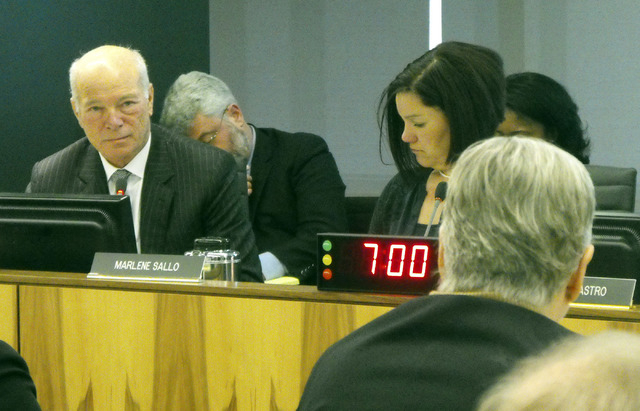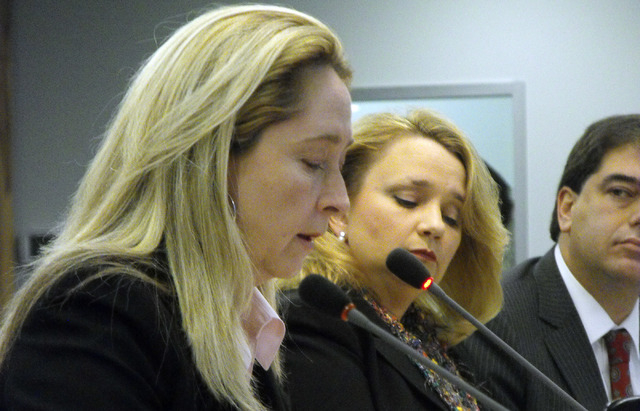Nevada flaws aired at ‘patient dumping’ session


WASHINGTON — Flaws in Nevada’s mental health system played a central role on Friday as a federal civil rights panel investigated the “dumping” of patients from psychiatric hospitals.
Members of the U.S. Commission on Civil Rights were shown a video news clip of James Flavy Coy Brown, a patient at the Rawson-Neal Psychiatric Hospital in Las Vegas who was discharged in February 2013 and given a one-way Greyhound bus ticket to Sacramento, Calif., three days of medication and several bottles of Ensure. He had no family or friends in Sacramento nor treatment awaiting him.
Staci Pratt, legal director of the American Civil Liberties Union of Nevada, used the Brown case and other shortcomings in the Nevada health system to argue that federal laws need to be strengthened and government regulators need to act more aggressively to police psychiatric facilities.
“There are tools that would make hospitals more accountable,” Pratt said.
Brown was a central figure in an investigation by the Sacramento Bee that found Rawson-Neal had provided bus tickets out of town to as many as 1,500 psychiatric patients over a five-year period.
The scandal prompted the firing of two employees at Rawson-Neal, reforms in hospital discharge policies and the appointment by Gov. Brian Sandoval of an 18-member commission now in the midst of an examination of the state’s mental health system.
The ACLU of Nevada and a Sacramento attorney filed a federal class action lawsuit on behalf of Brown and other patients, charging that being released and bused out of state amounted to violations of their civil rights and several federal laws.
The case was dismissed last month by Judge James Mahan in the U.S. District Court of Nevada who ruled Brown was not coerced by the state to get on the bus or threatened if he did not do so. The ACLU said it planned to refile the case.
Apart from a legal matter, Civil Rights Commissioner Michael Yaki at the hearing asked what he said was a simple question:
“Is there anything about this that strikes you as fundamentally wrong as a practice, regardless of what condition that person might be in? Just the very notion that you can pack someone up, put him on a Greyhound and send him somewhere else to be someone else’s problem?”
The practice of “patient dumping” — which was defined as the premature discharge of patients who are indigent or have significant medical problems — is a national problem, experts told the commission.
“The treatment of mental illness is and has been an unwanted stepchild in the American health system,” said Susan Preston, an attorney who specializes in professional negligence cases at the Maryland firm of Goodell, DeVries, Leech & Dann.
“Is it just Nevada or is it everybody who’s broken? From what I’ve seen a lot of people are broken,” said Gina Greenwood, a health care attorney with the firm of Baker, Donelson, Bearman, Caldwell & Berkowitz.
The eight-member independent commission evaluates federal laws and policies that impact civil rights. It adopted patient dumping as its major study this year, with the aim of producing a report that could include recommendations for changes in law.
The major applicable law in this case is the Emergency Medical Treatment and Active Labor Act, or EMTALA. It requires hospitals to treat emergency patients and not discharge them before their conditions are stabilized.
The law failed Nevada patients, Pratt said. Enforcement “is broken, it is loose, ill-formed and lacks the type of consistent oversight necessary to make guarantees of EMTALA meaningful.”
In Nevada, “the abandonment of psychiatric patients took place over a series of years unchecked,” she said. Between 2009 and 2012, most complaints forwarded to the state Bureau of Health Care Quality and Compliance “were summarily dismissed after cursory reviews.” It took the Sacramento newspaper to expose problems.
Pratt urged the federal Centers for Medicare and Medicaid Services to become more active in policing hospital emergency services. She said federal contractors should conduct investigations rather than state boards, and independent monitors should be assigned to problem facilities to oversee their compliance with the law. And she recommended that more and larger fines against violators be fed into an “anti-dumping” fund to aid policing.
But Greenwood, whose primary clients are hospitals, warned against “heavy handed” regulation. She said the EMTALA law is viewed by medical facilities as an unfunded mandate.
“I’m afraid if we try to do mass regulations and mass legislation to address the bad apples, we are going to come up with unintended consequences,” she said. “I can tell you from training physicians that mental health patients are viewed not in a positive light.” Tougher rules, she said, will just increase the perception that they are ‘problems.’”
The state of Nevada was not an official participant in the hearing. Mike Willden, director of the state’s Department of Health and Human Services, was in the audience.
Willden said afterward that Nevada would submit written comments to the commission, including some to correct what he said were mischaracterizations about the Brown case and the state’s spending on mental health care. He said Sandoval and the Legislature have restored most of the cuts that advocates charge played a role in Rawson-Neal’s patient discharge practices.
“It’s important to review the James Brown case and we have several times in Nevada,” Willden said. “We have taken a number of corrective actions.”
Willden said staff at Rawson-Neal diverted from the state’s policy on patient discharges. The policy has since been updated to require a chaperone for departing patients and for discharge paperwork to be reviewed more closely.
“Did we get it right in every case? I will agree we did not get it right in every case,” Willden said. “As a general rule we thought we had a fairly compassionate policy, if done right.”
Contact Stephens Washington Bureau Chief Steve Tetreault at STetreault@stephensmedia.com or 202-783-1760. Follow him on Twitter @STetreaultDC.












